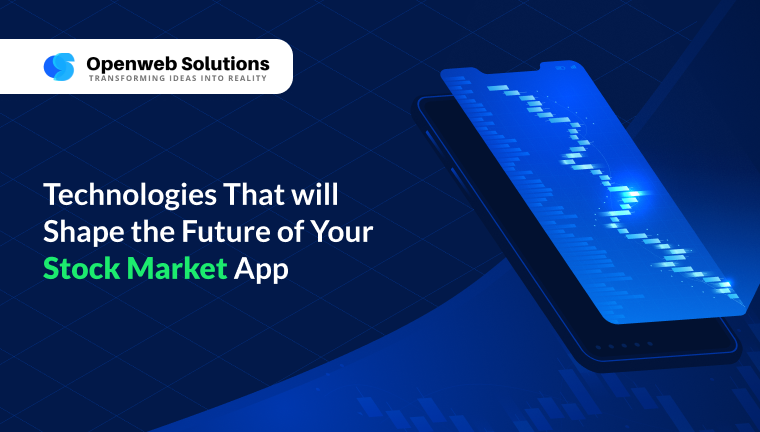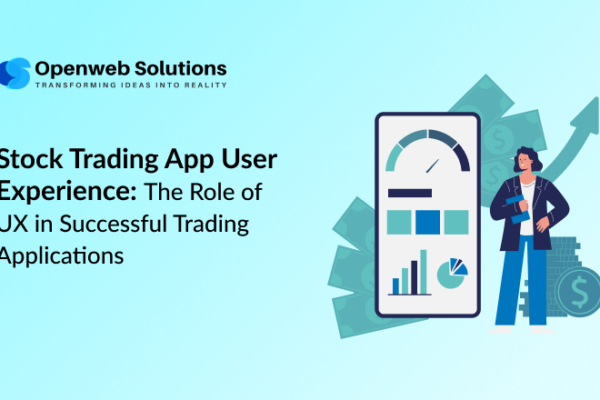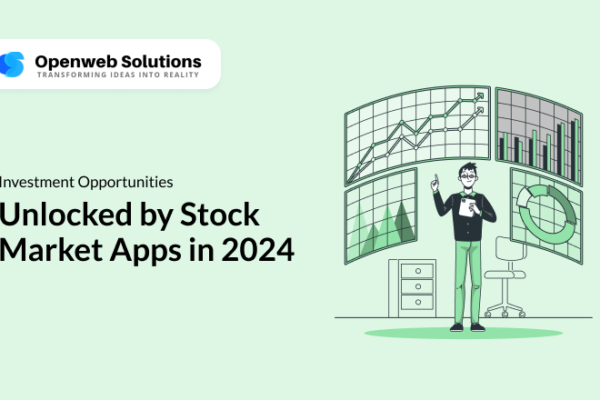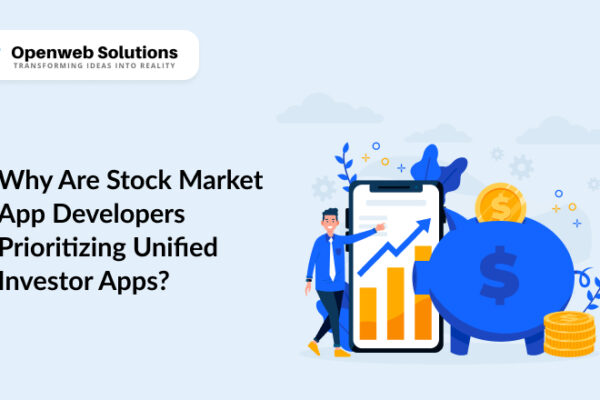Stock market investment requires more than just talent and instincts; it demands cutting-edge technology. As the demand for stock market apps continues to surge, developers are looking forward to the latest technologies and make apps to meet user expectations and deliver unparalleled experiences. With Stock Market App Development evolving rapidly, understanding the key technologies shaping its future is imperative. Let’s delve into the innovative solutions that will redefine the landscape of stock market apps.
Technologies that Redefine Stock Market Apps
1. AI and Machine Learning
The integration of Artificial Intelligence (AI) and Machine Learning (ML) is revolutionizing stock market app development. By analyzing vast amounts of data, AI-powered algorithms can uncover valuable insights, predict market trends, and offer personalized investment recommendations. From sentiment analysis of news articles to pattern recognition in trading data, AI empowers stock market apps to deliver real-time, data-driven insights to users, enhancing their decision-making capabilities.
2. Blockchain Technology
Blockchain, the underlying technology of cryptocurrencies, is poised to disrupt the traditional stock market ecosystem. Its decentralized nature ensures transparency, security, and immutability of transactions, making it ideal for trade settlement, clearing, and ownership tracking. Implementing blockchain in stock market software development can streamline processes, reduce fraud, and enhance trust among market participants, fostering a more efficient and trustworthy trading environment.
3. Big Data Analytics
In the world of Stock Market App Development, data is king. Big Data Analytics enables developers to extract actionable insights from vast volumes of structured and unstructured data, including market trends, social media sentiment, and historical trading patterns. By harnessing the power of Big Data, stock market apps can provide users with comprehensive market analysis, personalized investment strategies, and real-time portfolio monitoring, empowering them to make informed decisions in volatile markets.
4. Cloud Computing
The scalability, flexibility, and cost-effectiveness of cloud computing are reshaping the stock market app landscape. By leveraging cloud-based infrastructure, developers can seamlessly scale their apps to accommodate fluctuating user demands, enhance data accessibility and security, and reduce time-to-market for new features and updates. Whether it’s stock market website development or mobile app deployment, cloud computing offers unparalleled agility and reliability, ensuring seamless user experiences across devices and platforms.
5. Robotic Process Automation (RPA)
Automating repetitive tasks and workflows is essential for optimizing efficiency and productivity in stock market app development. Robotic Process Automation (RPA) enables developers to streamline manual processes, such as data entry, trade execution, and compliance reporting, freeing up valuable time and resources for innovation and value-added activities. By incorporating RPA into stock market software development, developers can accelerate time-to-market, minimize errors, and enhance overall user satisfaction.
6. Cybersecurity Solutions
With cyber threats on the rise, ensuring the security and integrity of stock market apps is paramount. Robust cybersecurity solutions, including encryption, multi-factor authentication, and intrusion detection systems, are essential for safeguarding sensitive user data, financial transactions, and intellectual property. By prioritizing cybersecurity in stock market app development, developers can build trust with users, mitigate the risk of data breaches, and protect their reputations in an increasingly interconnected world.
Winding up
The future of stock market apps is brimming with opportunities for innovation and disruption. By embracing technologies such as AI, blockchain, Big Data Analytics, cloud computing, RPA, and cybersecurity solutions, developers can create feature-rich, secure, and user-centric stock market apps that empower investors to navigate today’s complex financial markets with confidence. Whether it’s Stock Market App Development, stock market software development, or stock market website development, all these technologies are the key that will make your app dynamic in the world of finance and investment.
Let us focus on some important FAQ’s
FAQ 1: How do AI and Machine Learning benefit stock market apps?
AI and Machine Learning algorithms analyze vast data sets to uncover insights, predict market trends, and offer personalized investment recommendations. By utilizing these technologies, stock market apps can provide users with real-time, data-driven insights, enhancing their decision-making capabilities.
FAQ 2: What role does Blockchain play in stock market app development?
Blockchain technology ensures transparency, security, and immutability of transactions, making it ideal for trade settlement, clearing, and ownership tracking. By implementing blockchain, stock market apps can streamline processes, reduce fraud, and foster a more efficient and trustworthy trading environment.
FAQ 3: How does Big Data Analytics contribute to stock market apps?
Big Data Analytics enables developers to extract actionable insights from vast volumes of data, including market trends, social media sentiment, and historical trading patterns. By harnessing the power of Big Data, stock market apps can provide users with comprehensive market analysis, personalized investment strategies, and real-time portfolio monitoring.
FAQ 4: Why is cloud computing important for stock market app development?
Cloud computing offers scalability, flexibility, and cost-effectiveness, reshaping the stock market app landscape. By leveraging cloud-based infrastructure, developers can scale their apps to accommodate fluctuating user demands, enhance data accessibility and security, and reduce time-to-market for new features and updates.
FAQ 5: How does Robotic Process Automation (RPA) improve efficiency in stock market app development?
RPA automates repetitive tasks and workflows, such as data entry, trade execution, and compliance reporting, streamlining processes and freeing up resources for innovation. By incorporating RPA into development, developers can accelerate time-to-market, minimize errors, and enhance overall user satisfaction.
Partha Ghosh is the Digital Marketing Strategist and Team Lead at PiTangent Analytics and Technology Solutions. He partners with product and sales to grow organic demand and brand trust. A 3X Salesforce certified Marketing Cloud Administrator and Pardot Specialist, Partha is an automation expert who turns strategy into simple repeatable programs. His focus areas include thought leadership, team management, branding, project management, and data-driven marketing. For strategic discussions on go-to-market, automation at scale, and organic growth, connect with Partha on LinkedIn.






